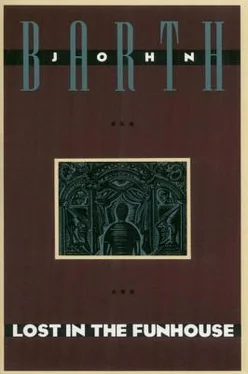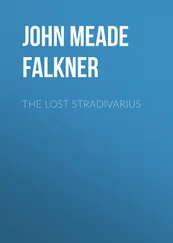John Barth - Lost in the Funhouse
Здесь есть возможность читать онлайн «John Barth - Lost in the Funhouse» весь текст электронной книги совершенно бесплатно (целиком полную версию без сокращений). В некоторых случаях можно слушать аудио, скачать через торрент в формате fb2 и присутствует краткое содержание. Год выпуска: 2014, ISBN: 2014, Издательство: Knopf Doubleday Publishing Group, Жанр: Современная проза, на английском языке. Описание произведения, (предисловие) а так же отзывы посетителей доступны на портале библиотеки ЛибКат.
- Название:Lost in the Funhouse
- Автор:
- Издательство:Knopf Doubleday Publishing Group
- Жанр:
- Год:2014
- ISBN:978-0-8041-5250-1
- Рейтинг книги:3 / 5. Голосов: 1
-
Избранное:Добавить в избранное
- Отзывы:
-
Ваша оценка:
- 60
- 1
- 2
- 3
- 4
- 5
Lost in the Funhouse: краткое содержание, описание и аннотация
Предлагаем к чтению аннотацию, описание, краткое содержание или предисловие (зависит от того, что написал сам автор книги «Lost in the Funhouse»). Если вы не нашли необходимую информацию о книге — напишите в комментариях, мы постараемся отыскать её.
Lost in the Funhouse — читать онлайн бесплатно полную книгу (весь текст) целиком
Ниже представлен текст книги, разбитый по страницам. Система сохранения места последней прочитанной страницы, позволяет с удобством читать онлайн бесплатно книгу «Lost in the Funhouse», без необходимости каждый раз заново искать на чём Вы остановились. Поставьте закладку, и сможете в любой момент перейти на страницу, на которой закончили чтение.
Интервал:
Закладка:
“And when I was on the beach at Pharos, seven years lost en route from Troy, clinging miserably to Proteus for direction, he prophesied a day when I’d sit in my house at last, drink wine with the sons of dead comrades, and tell their dads’ tales; my good wife would knit by the fireside, things for our daughter’s wedding, and dutifully pour the wine. That scene glowed so in my heart, its beat became the rhythm of her needles; Egypt’s waves hissed on the foreshore like sapwood in the grate, and the Nile-murk on my tongue turned sweet. But then it seems to me I’m home in Sparta, talking to Nestor’s boy or Odysseus’s; Helen’s put something in the wine again, I know why, one of those painkillers she picked up in Africa, and the tale I tell so grips me, I’m back in the cave once more with the Old Man of the Sea.”
One thing’s certain: somewhere Menelaus lost course and steersman, went off track, never got back on, lost hold of himself, became a record merely, the record of his loosening grasp. He’s the story of his life, with which he ambushes the unwary unawares.
2
“ ‘Got you!’ ” I cry to myself, imagining Telemachus enthralled by the doctored wine. “ ‘You’ve feasted your bowels on my dinner, your hopes on my news of Odysseus, your eyes on my wife though she’s your mother’s age. Now I’ll feast myself on your sotted attention, with the tale How Menelaus First Humped Helen in the Eighth Year After the War. Pricked you up, that? Got your ear, have I? Like to know how it was, I suppose? Where in Hades are we? Where’d I go? Whom’ve I got hold of? Proteus? Helen?’
“ ‘Telemachus Odysseus’-son,’ the lad replied, ‘come from goat-girt Ithaca for news of my father, but willing to have his cloak clutched and listen all night to the tale How You Lost Your Navigator, Wandered Seven Years, Came Ashore at Pharos, Waylaid Eidothea, Tackled Proteus, Learned to Reach Greece by Sailing up the Nile, and Made Love to Your Wife, the most beautiful woman I’ve ever seen, After an Abstinence of Eighteen Years.’
“ ‘Seventeen.’ ”
I tell it as it is. “ ‘D’you hear that click?’ ” I tell myself I asked Telemachus.
“ ‘ I do,’ said Peisistratus.
“ ‘Knitting! Helen of Troy’s going to be a grandmother! An empire torched, a generation lost, a hundred kings undone on her account, and there she sits, proper as Penelope, not a scratch on her — and knits!’
“ ‘Not a scratch!’ said Telemachus.
“ ‘Excuse me,’ Helen said; ‘if it’s to be that tale I’m going on to bed, second chamber on one’s left down the hall. A lady has her modesty. Till we meet again, Telemachus. Drink deep and sleep well, Menelaus my love.’
“ ‘Zeus in heaven!’ ” I say I cried. “ ‘Why didn’t I do you in in Deiphobus’ house, put you to the sword with Troy?’
“Helen smiled at us and murmured: ‘Love.’
“ ‘Does she mean,’ asked Peisistratus Nestor’s-son, come with Telemachus that noon from sandy Pylos, ‘that you love her for example more than honor, self-respect; more than every man and cause you’ve gone to war for; more than Menelaus?’
“ ‘Not impossibily.’
“ ‘Is it that her name’s twin syllables fire you with contrary passions? That your heart does battle with your heart till you burn like ashèd Ilion?’
“ ‘Wise son of a wise father! Her smile sows my furrowed memory with Castalian serpent’s teeth; I become a score of warriors, each battling the others; the survivors kneel as one before her; perhaps the salin were better men. If Aeneas Aphrodite’s-son couldn’t stick her, how should I, a mere near mortal?’
“ ‘This is gripping,’ ” I say to myself Telemachus said. “ ‘Weary as we are from traveling all day, I wish nothing further than to sit without moving in this total darkness while you hold me by the hem of my tunic and recount How Your Gorgeous Wife Wouldn’t Have You for Seven Full Postwar Years but Did in the Eighth. If I fail to exclaim with wonder or otherwise respond, it will be that I’m speechless with sympathy.’
“ ‘So be it,’ I said,” I say. “Truth to tell,” I tell me, “when we re-reached Sparta Helen took up her knitting with never a droppèd stitch, as if she’d been away eighteen days instead of ditto years, and visiting her sister instead of bearing bastards to her Trojan lovers. But it was the wine of doubt I took to, whether I was the world’s chief fool and cuckold or its luckiest mortal. Especially when old comrades came to town, or their sons, to swap war stoies, I’d booze it till I couldn’t tell Helen from Hellespont. So it was the day Odysseus’ boy and Nestor’s rode into town. I was shipping off our daughter to wed Achilles’ son and Alector’s girl in to wed mine; the place was full of kinfolk, the wine ran free, I was swallowing my troubles; babies they were when I went to Troy, hardly married myself; by the time I get home they’re men and women wanting spouses of their won; no wonder I felt old and low and thirsty; where’d my kids go? The prime of my life?
“When the boys dropped in I took for granted they were friends of the children’s, come for the party; I saw to it they were washed and oiled, gave them clean clothes and poured them a drink. Better open your palace to every kid in the countryside than not know whose your own are in, Mother and I always thought. No man can say I’m inhospitable. But I won’t deny I felt a twinge when I learned they were strangers; handsome boys they were, from good families, I could tell, and in the bloom of manhood, as I’d been twenty years before, and Paris when he came a-calling, and I gave him a drink and said ‘What’s mine is yours …’…” ….
Why don’t they call her Helen of Sparta?
“I showed them the house, all our African stuff, it knocked their eyes out; then we had dinner and played the guessing game. Nestor’s boy I recognized early on, his father’s image, a good lad, but not hero-material, you know what I mean. The other was a troubler; something not straight about him; wouldn’t look you in the eye; kept smiling at his plate; but a sharp one, and a good-looking, bound to make a stir in the world one day. I kept my eye on him through dinner and decided he was my nephew Orestes, still hiding out from killing his mother and her goat-boy-friend, or else Odysseus’ Telemachus. Either way it was bad news: when Proteus told me how Clytemnestra and Aegisthus had axed my brother the minute he set foot in Mycenae, do you think Helen spared him a tear? ‘No more than he deserved,’ she said, ‘playing around with that bitch Cassandra.’ But when we stopped off there on our way home from Egypt and found her sister and Aegisthus being buried, didn’t she raise a howl for young Orestes’ head! Zeus help him if he’d come to see his Uncle Menelaus! On the other hand, if he was Odysseus’ boy and took after his father, I’d have to keep eye on the wedding silver as well as on the bride.
“To matters worse, as I fretted about this our old minstrel wandered in, looking for a handout, and started up that wrath-of-Archilles thing, just what I needed to hear; before I could turn him off I was weeping in my wine and wishing I’d died the morning after my wedding night. Hermione barged in too, almost as pretty as her mom, to see who the stranger-chaps were; for a minute it was ‘Paris, meet Helen’ all over again, till I got hold of myself and shooed her out of there. Even so, a dreadful notion struck me: what if Paris had a son we didn’t know about, who’d slipped like slick Aeneas our Trojan clutch, grown up in hiding, and was come now to steal my daughter as his dad my wife! Another horse! Another Hector! Another drink.
“Even as I swallowed, hard and often, the fellow winked at the door I’d sent Hermione through and said, ‘Quite a place, hey, Nestor’s-son?’ Which was to say, among other things, Peisistratus was tagged and out of the game. Nothing for it then but to play the thing out in the usual way. ‘No getting around it, boys,’ I declared: ‘I’m not the poorest Greek in town. But I leave it to Zeus whether what you’ve seen is worth its cost. Eight years I knocked about the world, picking up what I could and wishing I were dead. The things you see come from Cyprus, Phoenicia, Egypt, Ethiopia, Sidonia, Erembi — even Libya, where the lambs are born with horns on.’
Читать дальшеИнтервал:
Закладка:
Похожие книги на «Lost in the Funhouse»
Представляем Вашему вниманию похожие книги на «Lost in the Funhouse» списком для выбора. Мы отобрали схожую по названию и смыслу литературу в надежде предоставить читателям больше вариантов отыскать новые, интересные, ещё непрочитанные произведения.
Обсуждение, отзывы о книге «Lost in the Funhouse» и просто собственные мнения читателей. Оставьте ваши комментарии, напишите, что Вы думаете о произведении, его смысле или главных героях. Укажите что конкретно понравилось, а что нет, и почему Вы так считаете.












